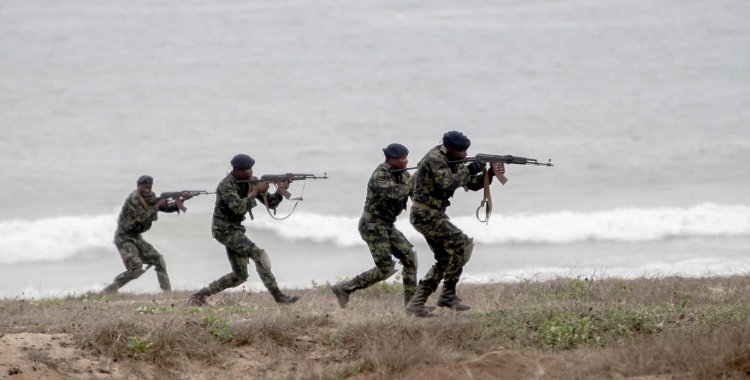The military cooperation agreement signed by São Tomé and Príncipe on the 24th of April and in force since the 5th adds another African country to the already extensive list of security and defense relations between Russia and Africa, but the Russian presence on the continent "is not substantial in terms of investment" and has been "largely amplified by Russian disinformation", said Crisis Group International researcher Enrica Pico, speaking to Lusa.
"Russia will continue to have a significant presence and should want to explore new territories or new areas [in Africa], in addition to the Sahel, where it entered following several coups d'état", said, on the other hand, Nicodemus Minde, researcher from the Institute for Security Studies (ISS), in Pretoria.
According to this analyst, "Moscow is not only looking at West Africa, but also at East Africa, namely Kenya, Tanzania, Uganda, Sudan, and further south, Mozambique as well, with Zimbabwe and with South Africa it maintains close historical relations".
Enrica Pico also considers that Russia will continue to expand its presence on the African continent, but will keep it "light". Moscow "will expand the number of agreements with countries with which it can maintain this slight presence and influence, if it does not cost too much investment", she told Lusa.
According to the researcher, who was part of the United Nations expert panel for the Central African Republic, where Russia has maintained a presence through the Wagner Group paramilitary group, "this strategy is very deep-rooted, and the Russians will take advantage of every opportunities as they can".
"And if the opportunity comes from the former Portuguese colonies or other countries that were not so open to Moscow until now, they will not take it for granted; they will keep their eyes open to any type of opportunity, as they have done until now", she underlined.
According to an investigation published by the European Parliament's (EP) "Think Tank" last February, Russia's invasion of Ukraine on February 24, 2022 and the subsequent open confrontation with the West in "all arenas", "have placed the African continent once again stands out as an area of geopolitical rivalry", to which Moscow – but not only – paid particular attention.
"Russia's current involvement in the continent seeks to break the diplomatic and economic isolation imposed by the West, reaffirm its own relevance on the international scene as a leader of the new 'polycentric world' and advance its geostrategic ambitions in matters of mining, energy and military presence in key areas", wrote researchers from the EP's research office Anna Caprile and Eric Pichon.
This investigation uncovered the existence of military agreements signed by Moscow with 43 African countries between 2015 and November 2023.
"These agreements reflect various levels of involvement, from general and ceremonial agreements to more specific and substantial cooperation in areas such as training military personnel, supplying weapons, supporting the fight against terrorism and access to ports and military or civilian air bases", write the researchers.
The agreement with São Tomé is similar, but brings a substantive novelty by providing for "cooperation" between the two countries "within the framework of international organizations and forums on fundamental issues of international security and stability", according to the text of the agreement, to which the Lusa had access.
As São Tomé voted twice in the United Nations General Assembly to condemn the Russian invasion of Ukraine, what was formalized above assumes particular relevance in a possible change in São Tomé's position in relation to the war in Europe.
In addition to having attempted to establish its own military bases in six countries (Central African Republic, Egypt, Eritrea, Madagascar, Mozambique and Sudan, according to the study), "only the agreement with Sudan appears to continue to be actively pursued".
"If concluded, the agreement with Sudan [from which there are indications that Moscow is supporting both sides in the war that began on April 15, 2023] will allow Russia to establish a 'logistics supply point' in Port Sudan for ships military, including nuclear ships, and install up to 300 soldiers at the naval base", highlight Caprile and Pichon.
Through military cooperation agreements and 'ad hoc' agreements, Russia has become an important arms supplier to Africa.
Imports from Russia accounted for 40 percent of African imports of major weapons systems in the period between 2018 and 2022, surpassing supplies from the United States, Europe and China.
In addition to the arms trade, Russia's trade with Africa has increased substantially since 2005, although it is still relatively insignificant when compared with other trading partners.
In 2022, Africa's imports from Russia represented less than 2 percent of the continent's total imports, while imports from the European Union and China represented 25 percent and 18 percent of the market, respectively, according to research by the EP office.
African exports to Russia represent an even smaller part of the market (less than 1 percent in 2022, compared to 33 percent for the EU and 12.18 percent for China). The United States' share is approximately 5 percent in both exports and imports.
Finally, Russia has a considerable presence in the African mining and energy market, with "Russian mining concessions being concentrated in countries characterized by poor governance, such as the Central African Republic, Guinea Conakry, Madagascar, Mozambique and Sudan, which makes it possible to blur the line between official concessions and unofficial concessions", according to the researchers.
Russian involvement in oil and natural gas extraction projects is more geographically diverse, but once again, Caprile and Pichon emphasize that "Russian companies are not official partners in any of the large African oil and gas projects". In fact, Russia contributes less than 1 percent of foreign direct investment in the sector on the continent.







